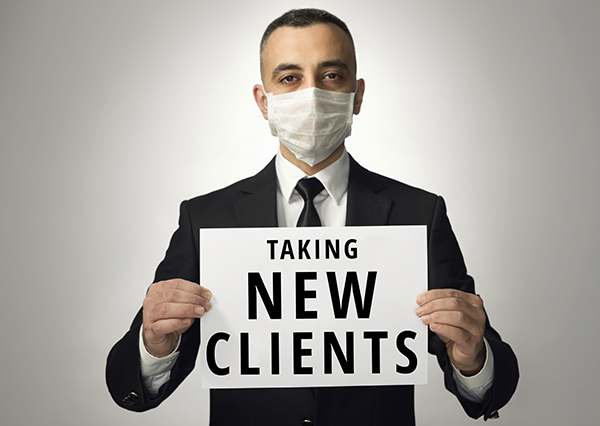See How Law Firms Are Responding to the Coronavirus Crisis

The situation changes daily. Law firms race to adapt. To stay strong through this disorienting coronavirus crisis, we need to support each other by sharing any ideas and experiences that might help.
So Firmidable surveyed articles about how law firms across America are dealing with these unsettling times.
Keep reading for an abbreviated report on some of the top insights we found.
Law Firms and the Remote Work Surge
Of course, the most obvious and immediate change wrought by the coronavirus on law firms—and countless other businesses—is the shift to remote work, so we can all stay away from each other and stop the virus from spreading while still getting things done.
Law.com described this process at several law firms. Arrangements included complete transitions to remote work, keeping some offices open with minimal staffing and dividing lawyers and staff members into groups that alternate when they work. Read the article here.
As part of their emergency response, law firms have been announcing their ability to remain fully functional, take new cases and move existing cases forward.
Clients of our law firm marketing agency have activated pop-up messages on their websites and added graphics to their television advertisements reassuring existing and new clients that they can still call a lawyer.
The messages include assurances that firms can conduct consultations and even hearings via video conference, and they note when legal services are considered essential—so still allowed to operate—under various local and state government stay-at-home orders.
But the Law.com article also discussed the uncertainties around the sudden rise of remote work, calling it, “a major test for an industry that is built on relationships.”
Coronavirus and Ethics for Law Firms
The D.C. Bar posted an article on how law firms should ethically factor the COVID-19 crisis into their client relationships, such as:
- Ensuring continuity of representation if an attorney gets sick
- Confirming clients’ health status so cases can be continued, court appearances can be waived, remote hearings can be planned and surrogate decision-makers can be designated if a client becomes too ill to speak for themselves
- Safeguarding the technology lawyers use to work remotely to protect client confidentiality
- Staying up-to-date on changing conditions, such as court closures, delays, orders covering filings and appearances and financial burdens clients face from the pandemic, and using that information to protect clients’ interests
Law Firms Producing Coronavirus Resources & Support
Some firms are creating new programs to keep their clients informed about the ramifications of the coronavirus, such as the Butzel Long business law firm in Detroit starting a Coronavirus Resource Center, as described in an article from LegalNews.com.
Varnum, which also has offices in Michigan, created a Coronavirus Task Force to help its business clients navigate the crisis, LegalNews said.
One Firmidable client, the Cuddy Law Firm, which represents families in special education access and special needs estate planning cases in several states, is hosting online workshops on topics such as protecting your child’s right to educational services during the virus outbreak.
For Some Law Firms, Demand for Their Services Is Spiking
The ABA Journal reported that employment law firms have been inundated with calls from businesses about how to manage employees diagnosed with COVID-19 or exposed to it. Read the article here.
“There was really an immediate need by our clients for information on how to address in real time these very unusual circumstances,” Amy Traub, chair of the National Labor and Employment Group at the firm BakerHostetler, said in the article.
The ABA Journal also said employment lawyers who represent employees have been getting new questions from workers about workplace safety issues in the time of coronavirus.
And lawyers with health care clients have been busy advising medical providers on how to approach patients with the coronavirus, how to address concerns from employees and more.
“We are working with our clients to approach this in a very logical, reasoned and science-focused way,” Melissa L. Markey, an attorney at Denver’s Hall, Render, Killian, Heath & Lyman, P.C., said in the article.
The economic fallout from the coronavirus could also create demand for other types of law firms, helping with issues like debt restructuring, contractual obligations surrounding canceled events, insurance disputes, bankruptcy and more, the article said.
At the Firmidable legal marketing agency, we’ve worked for decades with law firms that have similar economically counter-cyclical qualities, such as Social Security Disability law firms who often see more clients seeking disability benefits when unemployment is high.
Of course, it doesn’t work that way for everyone. Many firms face serious drop-offs in demand and the resulting economic hardships.
But in the spirit of supporting each other, Firmidable is happy to share what we’re hearing from law firms across America and our own experiences with this and past crisis situations. For ideas and strategies on coping with the coronavirus crisis at your law firm, talk to us at Firmidable.
Firmidable has been a national expert in legal marketing for almost 30 years. It brings law firms customized, data-driven marketing strategies and services, including online and traditional media for a wide range of legal practices. From Maine to Hawaii, it has transformed the lives of attorneys—and their clients.
